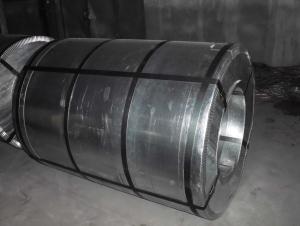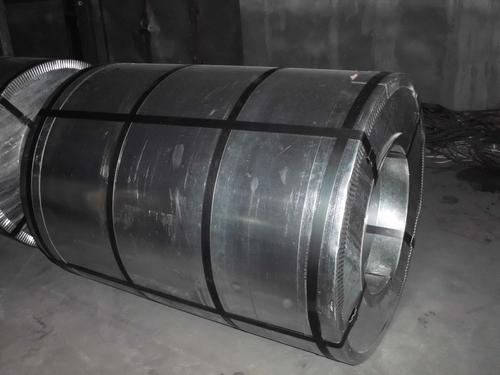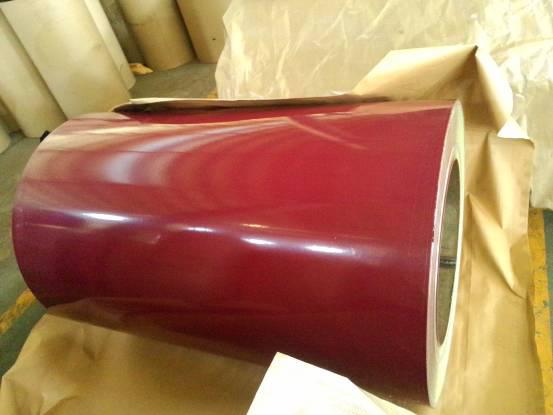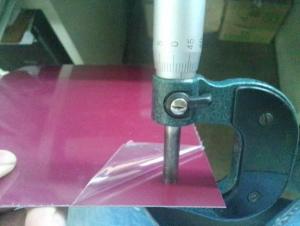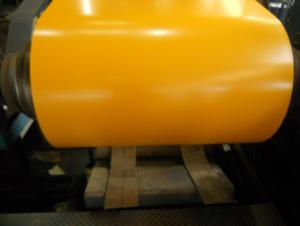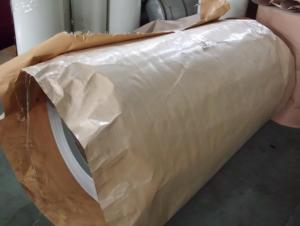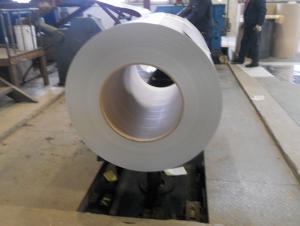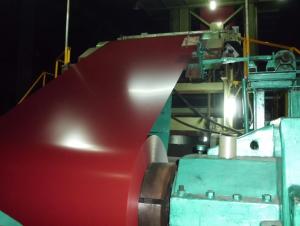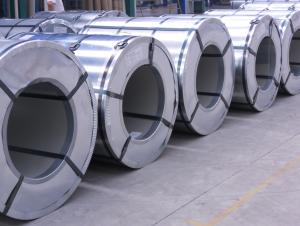Pre-painted Galvanized Steel Coil-JIS G 3312-RAL6005
OKorder Service Pledge
OKorder Financial Service
You Might Also Like
Pre-painted Galvanized Steel Coils/ PPGI/GI
I Specifications:
1.Thickness:0.16-2.0mm
2.Width:600-1500mm
3.Material: SGCC,SGCD,SECC,SECD,DX51D+Z
4.Zinc coating:40-275G/M2
5.Surface Structure: galvanized ,zero spangle, regular spangle or normal spangle
6.Surface treatment: chromated and oiled, chromated and non-oiled
7.Color:all RAL series
II Main characteristics :
1.strong corrosion resistance
2.surface quality
3.conducive to deep processing,such as the embossed PPGI,printed PPGI&punching PPGI
4.economy and practicality
III Applications:
Household Appliance:
1.Refrigerator shutter &side panels, Washer, Freezers, Air conditions,
2.Rice Cooker, Microwave Ovens, Water Heaters, Sterilization Cabinets, Range Hoods
3.Computer Panels , DVD/DVB panels, TV back panel etc.
Teaching Board: whiteboard, blackboard, green board(chalk board).
Indoor Decoration: Fireproof Door, kitchen cabinet, wall decoration.
Shipping Industries: Ship, Fecht, Marine.
Elevator/Medical Equipment/Rubbish Bin.
Thickness:0.17mm-0.8mm
Width:600mm-1250mm
Prepainted Galvanized Steel Coil
- Q: How are steel coils tested for mechanical properties?
- Steel coils are tested for mechanical properties through various methods, including tension testing, hardness testing, and impact testing. Tension testing involves applying force to the coil until it breaks, allowing for the measurement of its strength and elongation. Hardness testing determines the coil's resistance to indentation, providing insight into its overall strength and durability. Impact testing determines the coil's ability to withstand sudden applied loads by subjecting it to a high-velocity impact and measuring its ability to absorb the energy. These tests help ensure that steel coils meet the required mechanical properties for their intended applications.
- Q: All the appliances in my kitchen are stainless steel, and I hate how they look becuase every time I wash them they are full of streaks. Is there a good cleaner made for stainless steel that won't leave streaks?
- Stainless Steel Appliance Cleaning Stainless steel kitchen appliances look best when they're clean and shiny. To clean tough stains and cooking grease, and give them a dazzling shine, try the same detergent you would use when washing the dishes. One formulated to cut grease works especially well.This also works well for general kitchen cleaning.Waterless hand soap also works great as a polish, simply rub on, and polish - no rinsing.=)
- Q: How do steel coils contribute to the construction industry?
- Steel coils play a crucial role in the construction industry by serving as the primary raw material for a wide range of applications. These coils are used in the construction of buildings, bridges, highways, and other infrastructure projects. They are used to manufacture various structural components, including beams, columns, and trusses, providing strength, durability, and stability to the structures. Steel coils also contribute to the industry by enabling the fabrication of roofing and siding materials, reinforcing bars, and other construction elements. Their versatility, high strength-to-weight ratio, and resistance to corrosion make steel coils an essential resource for the construction industry.
- Q: What are the common defects in steel coils?
- Some common defects in steel coils include surface defects like scratches, rust, and pits, as well as internal defects like cracks, laminations, and non-uniform thickness. Other defects may include coil set, which is a curvature in the coil, and edge wave, which is a distortion along the edges of the coil.
- Q: .Yea, so I just saw the old Conan movie with Arnold. Good movie, but I still don't get it. What IS the riddle of steel???I get that like from the begining Conan's dad is like telling him a story about Crom and giants, and people got steel once Crom killef the giants. Then, later on in the movie Conan's talking to his lil' asian homie, and Conan tells him that when he dies... he'll go before Crom, and Crom will ask him what the riddle of steel is, and if he doesn't know it he'll get kicked out of barbarian heaven!But, what is the riddle of steel???C'mon guys... I want to in to barbarian heaven! LolBut, seriously though... what us it???.
- Riddle Of Steel
- Q: What are the common methods of slitting steel coils?
- There are several common methods of slitting steel coils, each with its own advantages and applications. 1. Rotary Shear Slitting: This method involves using rotary cutting knives to slit the steel coil. The coil is fed through the rotary shear machine, and the knives make simultaneous cuts along the length of the coil. Rotary shear slitting is known for its high-speed operation and ability to handle thicker gauge materials. 2. Loop Slitting: Loop slitting is a method where the steel coil is fed into a looping pit, creating a loop of material. The loop is then pulled through a set of knives that make the slits. This method is commonly used for thin gauge materials and provides precise cuts with minimal burr. 3. Drag Slitting: In drag slitting, the steel coil is fed through a set of driven rolls or drag pads, which help to maintain tension on the material. The coil is then guided through circular knives that make the slits. Drag slitting is suitable for various gauges of steel and offers good accuracy and edge quality. 4. Crush Slitting: Crush slitting involves passing the steel coil through a set of rolls, where one roll is rubber-covered and the other is hard. The rubber roll compresses the material against the hard roll, creating the slits. This method is commonly used for thin gauge or delicate materials as it minimizes the risk of edge damage. 5. Laser Slitting: Laser slitting utilizes a high-powered laser beam to make precise cuts on the steel coil. This method is highly accurate and allows for complex slitting patterns and narrow width cuts. Laser slitting is often used for high-end applications that require superior edge quality. Each of these methods has its own advantages and is chosen based on factors such as material thickness, desired edge quality, production speed, and cost considerations. It is important to carefully select the appropriate slitting method to ensure the desired outcome and efficiency in steel coil processing.
- Q: What are the different methods of surface inspection for steel coils?
- Steel coils can undergo surface inspection using various methods, each with its advantages and limitations. Among the commonly used techniques are: 1. Visual Inspection: Inspectors visually examine the steel coil surface for defects like scratches, dents, or discoloration. Though subjective and reliant on inspector expertise, this method proves cost-effective for detecting obvious defects. 2. Magnetic Particle Inspection (MPI): This method involves applying a magnetic field to the coil and then iron particles on the surface. Disruptions in the magnetic field caused by defects or cracks gather the particles, making the flaws visible. MPI effectively detects surface cracks and defects not easily seen by the naked eye. 3. Eddy Current Testing (ECT): ECT, a non-destructive testing method, employs electromagnetic induction to identify surface defects in steel coils. A probe with a coil generates an alternating magnetic field near the coil surface. Changes in electrical conductivity or magnetic permeability due to surface defects lead to a change in the induced current, which can be analyzed. ECT successfully identifies cracks, corrosion, and other surface irregularities. 4. Ultrasonic Testing (UT): High-frequency sound waves are used to examine both the surface and subsurface of steel coils. A transducer sends ultrasonic waves into the steel, and the reflected waves are analyzed to detect material changes or anomalies. UT effectively identifies cracks, delaminations, or voids within the coil, providing valuable insights into the steel's structural integrity. 5. Optical Inspection: This technique utilizes advanced imaging techniques like cameras or laser scanners to capture high-resolution images of the coil surface. These images are then analyzed for defects such as scratches, pits, or irregularities. Optical inspection provides detailed information and is often used alongside other methods for a comprehensive inspection. It is important to note that each method has its limitations and may be more suitable for specific defect types or surface conditions. Therefore, a combination of these techniques is often employed to ensure a thorough and accurate inspection of steel coils.
- Q: Can steel coils be used in the production of construction machinery?
- Yes, steel coils can be used in the production of construction machinery. Steel coils are often used as raw materials for manufacturing various components of construction machinery, such as frames, supports, and structural parts. The strength, durability, and resistance to corrosion of steel make it an ideal material for construction machinery, ensuring the longevity and reliability of the equipment.
- Q: Are steel coils corrosion-resistant?
- Yes, steel coils can be corrosion-resistant depending on the type of steel used and any additional protective coatings applied.
- Q: How are steel coils used in the production of automotive chassis?
- Steel coils are used in the production of automotive chassis as they are cut and shaped into various components, such as frame rails and crossmembers, which form the structural foundation of the vehicle. The high strength and durability of steel make it an ideal material for chassis construction, providing stability and safety to the overall vehicle structure.
Send your message to us
Pre-painted Galvanized Steel Coil-JIS G 3312-RAL6005
OKorder Service Pledge
OKorder Financial Service
Similar products
Hot products
Hot Searches
Related keywords
